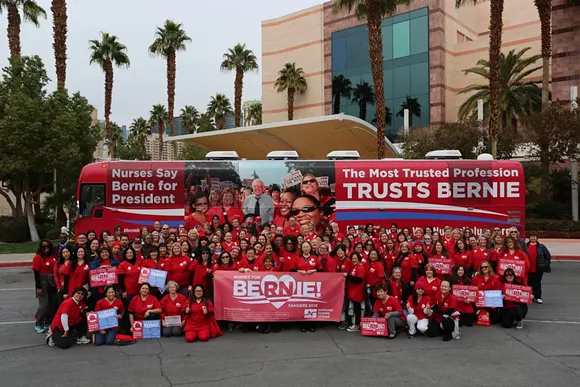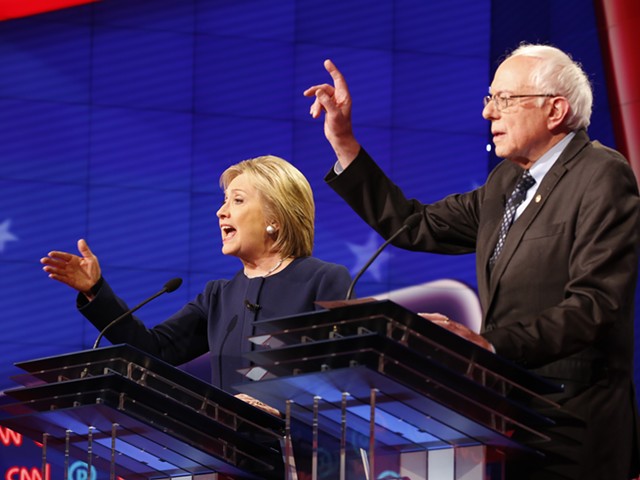National nurse’s union’s ‘Bernie Bus’ to arrive in Detroit and Flint
[
{
"name": "GPT - Leaderboard - Inline - Content",
"component": "35519556",
"insertPoint": "5th",
"startingPoint": "3",
"requiredCountToDisplay": "3",
"maxInsertions": 100
}
]
Earlier this week, in the middle of Super Tuesday, we had an interesting chance to talk to electoral activists courting this year’s swing voters. They’re a large group of nurses from National Nurses United, and their vehicle is called the Bernie Bus. That’s right: They’re riding a big, red bus across the country in an effort to educate voters on the candidate’s stand on single-payer health care, the Canadian-style system that takes decisions out of the hands of insurance companies and puts them in the hands of healthcare practitioners. Of course, Sanders’ platform is full of long-neglected planks that traditionally belong to the Democratic Party, such as jobs programs, checking Wall Street excesses, making college affordable, and more. But single-payer has long been an issue that nurses, especially among nurse’s unions. And that brought us into a phone call with Jean Ross, an acute care nurse at Fairview Southdale Hospital in Minnesota — at least when she isn’t barnstorming around the country in support of candidate Sanders as co-president of National Nurses United in the union’s Bernie Bus.
Metro Times: So, you’re really riding around on a bus supporting Bernie Sanders’ stand on single-payer?
Jean Ross: Basically everything that is on Bernie’s platform is part of what we call our Main Street Contract. So single-payer is huge on our list. The Robin Hood tax is huge on our list. Basically everything that will benefit public health is on Bernie’s platform and therefore it’s on ours.
MT: What’s the Robin Hood tax?
Ross: It’s a tiny financial transaction tax on some of the riskiest of trades on Wall Street, those that are made by computers every millisecond, and the ones that are responsible for really tearing apart our country in ’08. Everything you and I do, we pay a sales tax on, but these traders pay nothing every time they do what they do for a living. And so it would sort of disincentivize the riskiest of trades, and kind of put back some of the money back into productive investment that those traders have taken away out of the system.
MT: And single-payer insurance is something different again from the Affordable Care Act, which was about giving people access to health insurance.
Ross: Absolutely. We’re very careful to try not to criticize the Affordable Care Act too much because it’s what we have, and it did insure so many millions more, of course. But I think people forget, other than Bernie, that there are still so many of us underinsured. And our goal as nurses for people in this country was never to ensure that everybody had insurance, it was to ensure that everybody was entitled to care, cradle to grave.
MT: What special message do you have for people living in Detroit?
Ross: Well, you know, we do our thing as nurses, we do educate them, it’s part of our job as nurses. But we also listen. I think that’s part of where we get most of our assessment of what’s wrong with patient, or what’s wrong with society.
When I was a young nurse, it was so simple. You got somebody who was ready to leave the hospital, you gave them discharge instructions, and you said, “OK, you come back at a certain point to see this doctor and we’ll check this out.” Now, you don’t know if you’ll ever see these people again because they don’t have a home to go to. If they’re lucky, they’re living out of their cars. We didn’t use to see that years ago. People are worrying about paying for meals and their medications versus paying their rent. They have to make choices.
The environmental hazards, which is another thing we really appreciate about Bernie Sanders. Those are the kind of things that people talk to us about: “I’m sicker than I used to be. My kids have asthma.” We didn’t have asthma in the family when I grew up. Well, you got all these pollutants, and now of course the lead crisis in Flint. What do we expect will happen? Whenever you put profits over people, you are going to continue to see this, and unfortunately, apparently, some of us matter more than others. Because if you’re poorer, the poorest of the poor, the people of color, especially black, you are not going to get the same kind of care, if you get it at all, that you will, that people in other communities will.
MT: Where will you stop in our area?
Ross: We’ll be stopping in places along the way, like Wayne State University, Eastern Market, definitely in Flint — we’ll be there for the Democratic Debate. But no matter where we go, they either want to tell us why they like Bernie, or they’re still trying to decide. And they’ll ask us nurses what we know about him because it’s true what the bus says: Nurses are the most trusted profession in the country. And those in the most trusted profession trust Bernie.
MT: I think one of the things we don’t talk about enough when we mention single-payer is the way it could free up people to pursue their dreams, whether as an entrepreneur or as a volunteer.
Ross: Absolutely. I mean, we talk about that all the time. We could relate even that to mental health for you as an employer. You do not have to be stressed out about where that money is going to come from. Because, you know, people who run small businesses honestly care about their employees. They want to do the right thing. We’re not talking multinational corporations here. So it would mean a job created for so many people. And then there is the added benefit for those of you who would like to earn a different kind of income. Maybe you aren’t an entrepreneur or whatever, but you just have to be tied to a job for health insurance. So you spend a great part of your life, if not the whole of one, doing something you really don’t want to do.
MT: That insecurity about health care isn’t just driving people to the Sanders tent, it’s also driving people to the other extreme.
Ross: Yeah, there have been comparisons drawn, and rightly so. I see it myself, when you look at what they’re calling populism. I sort of have a different type of belief of what populism is. Trump is called populist, but if you look at his message and you look at Bernie’s, of course there are similarities in what they’re tapping into. Bernie always says, “enough is enough” and he’s said that for years. When is this going to stop? You can’t survive this way. The social safety net is broken. So you got these individuals, unfortunately, who are responding to Trump’s message, and he is telling them the reason you have all of this happening to you is “them.” There’s always a “them” you can blame. So you can latch onto that message as opposed to Bernie’s, which is the honest one: It’s because you’ve got multinational corporations running our government. You’ve got them running our world. You got Wall Street taking every bit of money out of the economy that used to go for keeping our society whole and well. Now that’s the real reason, and we know it, but not everybody latches onto that message. It’s the other one seems so attractive because people are just so angry. A little well-placed anger is good, it spurs you to do something. And those of us that are attached to Bernie know that’s the way to do something. A real movement-based politics.
MT: Well, it’s kind of a no-brainer as far as issues go. Aren’t a majority of Americans in favor of single-payer health care?
Ross: That’s what we find as we travel the country. And this is well before the Bernie Bus, the majority of Americans across the country want Medicare for all. They understand it. It’s the political will of the people, and it’s being held back by the powers that be. That’s why you get this anti-establishment message. You are not letting the people govern their own country, and that’s not a democracy. We’re losing that. And Bernie gets that.
The National Nurses United Bernie Bus is scheduled to be in Detroit March 5, and in Flint March 6. See nationalnursesunited.org or the group’s Facebook page for more information.






